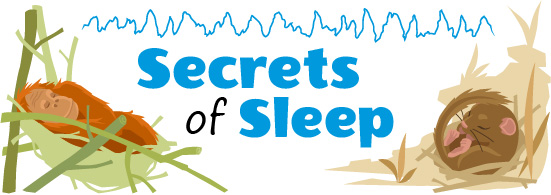Why Do We Sleep?
People spend nearly 1/3 of their lives sleeping. Oddly, we still are not completely sure why. Here, we’ll explore some of hypotheses for why we sleep. It’s important to keep in mind that all of these hypotheses may be partially true—there probably isn’t just one reason as to why we sleep.
Improved Health

If you’ve ever missed a night of sleep, you may feel sluggish, hungry, and maybe weirdly hot or cold on the next day. If you deprive yourself of sleep for days and days, you may start getting sick a lot and gain weight. Sleep regulates many internal processes in your body. Long-term sleep deprivation can alter metabolism and increase stress. These changes can lead to increased body temperature, weight gain, high blood pressure, strong inflammation, and a reduced ability to fight off infections.
Sleep Helps Learning and Memory
Your teachers and parents have probably advised you to get a good night’s sleep before taking exams. This advice is based on the popular belief that sleep helps with memory retention. Research has provided some evidence to back up this advice. A good night’s sleep includes REM sleep, which helps with remembering procedures, foreign languages, logic, and emotions. However, REM sleep is not necessary for processing long-term memories of facts, experiences, and concepts. Therefore, while sleep will help you ace that exam, it will not guarantee it.
Energy Conservation and Safety

Do you ever wonder why we sleep at night as opposed to during the day? One explanation is that our ancestors needed daylight to do activities such as hunting and foraging. Furthermore, our ancestors also needed to avoid predators that roamed around at night. By sleeping, our ancestors were able to conserve energy while they weren’t able to search for food, and were able to escape the detection of predators by staying still and keeping quiet.
Quality, Not Quantity
If sleep is so great for our health and mind, then why didn’t humans evolve to sleep longer? To answer this question, scientists compared the benefits of staying awake, such as finding food and interacting with each other, with the benefits of sleeping. Overall, scientists found that only daily habits appeared to have a significant impact on sleep duration. This means that, in general, we will sacrifice increased amounts of sleep (and the associated positive effects on the body) for more time to engage in daily activities, like looking for a mate, finding food, or other positive behaviors. These other activities appear to have allowed us to learn and do things that outweigh the negative effects of sleep deprivation on the body.
Additional images via Wikimedia Commons. Girls chatting by Rod Waddington.
Read more about: Secrets of Sleep
Bibliographic details:
- Article: Why Do We Sleep?
- Author(s): Dr. Biology
- Publisher: Arizona State University School of Life Sciences Ask A Biologist
- Site name: ASU - Ask A Biologist
- Date published:
- Date accessed:
- Link: https://askabiologist.asu.edu/why-do-we-sleep
APA Style
Dr. Biology. (). Why Do We Sleep?. ASU - Ask A Biologist. Retrieved from https://askabiologist.asu.edu/why-do-we-sleep
Chicago Manual of Style
Dr. Biology. "Why Do We Sleep?". ASU - Ask A Biologist. . https://askabiologist.asu.edu/why-do-we-sleep
Dr. Biology. "Why Do We Sleep?". ASU - Ask A Biologist. . ASU - Ask A Biologist, Web. https://askabiologist.asu.edu/why-do-we-sleep
MLA 2017 Style

Humans will often trade off sleeping hours with the chance to socialize and form stronger community bonds.
Be Part of
Ask A Biologist
By volunteering, or simply sending us feedback on the site. Scientists, teachers, writers, illustrators, and translators are all important to the program. If you are interested in helping with the website we have a Volunteers page to get the process started.

